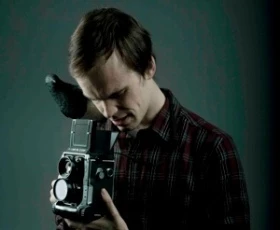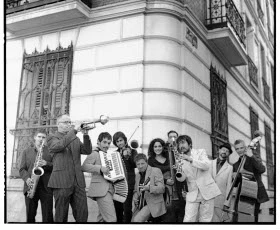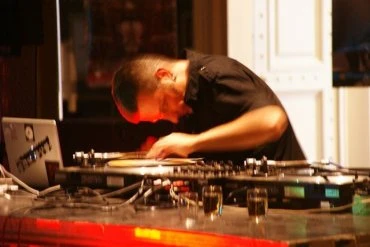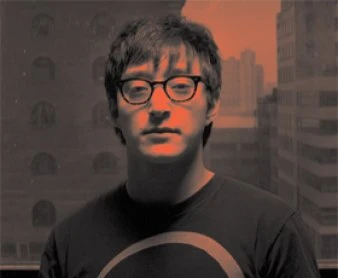-
September 18, 2013
Helado negro
Helado Negro, Roberto Carlos Lange by name, was born in Florida in 1980. His childhood was marked by the music of the soundsystems and radios that were heard all over his neighbourhood, and the bands that played at the traditional popular events, and this is the environment that ended up shaping his work.
He has collaborated on occasion with Prefuse 73 and he produced its most recent album, Everything She Touched Turned Ampexian (Warp, 2010). Lange belongs to the generation of U.S.-born artists of Latin origin who have created a new musical context in which their roots merge with anglo-saxon musical structures. His last album, Invisible Life (2013), released through Asthmatic Kitty (Sufjan Stevens's label), includes collaborations with Devendra Banhart and Jan St. Werner from Mouse on Mars. Helado Negro also works with Julianna Barwick in the project OMBRE. -
September 25, 2013
Kalabrese
Behind Kalabrese is Sacha Winkler, an important figure in today's music scene in Zurich. Dj, producer and owner of Club Zukunft, Kalabrese released Rumpelzirkus (Stattmusik) in 2007. References such as Thomas Brinkmann, Ricardo Villalobos and Matthew Herbert are useful for understanding his work.
Kalabrese has also remixed artists and labels such as Tosca, Crosstown Rebels, dOP and Filewile. Over the past two years he has travelled on the international club circuit and taken part in festivals such as Sonar, Mutek and Transmediale Berlin. Kalabrese's new record, Independent Dancer (2013), follows the road that Rumpelzirkus started out on but its compositions have become more dynamic and intense. -
October 2, 2013
Carmen Villain
Carmen Villain used to combine a career in fashion with the writing of the songs that would become her debut album, Sleeper (2013). Released through the label Smalltown Supersound, the album represents her departure from the world of fashion. Carmen was born in the United States, lives in London, is half Norwegian and half Mexican, a blend that can be felt in all of her compositions.
Sleeper is a record full of feedbacks and shoegazing, coproduced by Emil Nikolaisen (Serena-Maneesh) and mastered by Bob Weston, of Shellac. Smalltown Supersound also released an EP with Prins Thomas and Optimo remixes. -
October 9, 2013
Amateur Best
Five years have passed since Joe Flory began his music career as Primary 1. He made his first album, Other People, in 2010 and then disappeared from the music scene to work in graphic design and illustration. Three years later, Flory returns with a new project, Amateur Best, and a new record, No Thrills (2013), released through Double Denim (Hari Ashurst's label and frequent collaborator at Pitchfork). No Thrills is an autobiographical album, brimming with references to his childhood, his fascination with pop and his discovery of Michael Jackson's music, and it also contains a number of collaborations, such as that of Chilly Gonzales. Amateur Best is a techno pop mixed with soul and it was meticulously produced.
-
October 16, 2013
Serengeti
The MC and producer from Chicago, Serengeti, has released over 14 records in 10 years. He has worked with several of his colleagues at the Anticon label, including Yoni Wolf from WHY?, Odd Nosdam, Doseone and also Sufjan Stevens, among others. Serengeti's projects have almost always oscillated between the introspective tone he used in records such as C.A.R. (Anticon, 2012) and the most recent Saal (Graveface, 2013), the rap of Bells & Floating World (Polyphonic) and the electronics of Family & Friends (2011), with Owen Ashworth from Casiotone for the Painfully Alone.
-
October 23, 2013
Emika
Emika is the artistic name of Ema Jolly, a British artist of Czech origin who grew up in Milton Keynes, England, where she studied classical piano and composition. At the age of 17 she moved to Bristol and there she discovered the city's bass scene at its height and met artists such as Pinch and Loefah from Digital Mystikz. After completing studies in Musical Technology she settled in Berlin, where she works for Native Instruments. Her solo debut, the EP Double Edge (Ninja Tune, 2010), combined dubstep bases with her own voice and at the end of 2011 she released her first full album, named after the artist and recorded in collaboration with Rashad Becker.
In Berlin she discovered the club Berghain, where she would begin to make field recordings with which she created a library of sounds that would later become the foundation of the compilation “n”, released through stgut on (the club's label) and with the participation of all the club's resident DJs. In her most recent album, DVA (2013), lyrics take on greater importance and the sounds are more accessible.
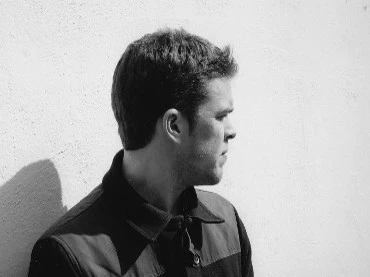
Held on 18, 25 Sep, 02, 09, 16, 23 Oct 2013
Acoustic Space returns to Museo Reina Sofía this September. The concert series began in 2010 as a way for the Museum to make a place in its programming for the wide range of currents in today's heterogeneous musical scene.
Now, with the structures that sustained the 20th century musical industry broken, the expansion of Internet has set off a process by which musical styles are being fragmented into a broad diversity of sub-styles, all with access to a global market. As a result, over the last 20 years an international music scene has been developing in which voices that previously had little chance of being heard now form part of a new industry that allows myriad sound realities to co-exist with one another, each one adding complexity and diversity to the scene.
This is the point of departure for Acoustic Space, a series of deeply-nuanced performances that allow for faithful expression of personal musical identity, with artists such as Peter Broderick, Bugge Wesseltoft, Shigeto, Cibelle, Nils Frahm and Colin Stetson, who have participated in previous editions.
This time the series features a selection of artists who have released, all of them, a new album in 2013. The musical proposals include the organic house style of the Swiss Kalabrese, the mix of Latin sounds with electronic structures by Helado Negro, the distorted guitars of the Norwegian Carmen Villain, the emotional synthpop of Amateur Best, the lean productions of Chicago's MC Serengeti and the pop with synthetic atmospheres and vocal lines by the Brit Emika.
Sponsorship
Mahou

Más actividades

Institutional Decentralisation
Thursday, 21 May 2026 – 5:30pm
This series is organised by equipoMotor, a group of teenagers, young people and older people who have participated in the Museo Reina Sofía’s previous community education projects, and is structured around four themed blocks that pivot on the monstrous.
This fourth and final session centres on films that take the museum away from its axis and make it gaze from the edges. Pieces that work with that which is normally left out: peripheral territories, unpolished aesthetics, clumsy gestures full of intent. Instead of possessing an institutional lustre, here they are rough, precarious and strange in appearance, legitimate forms of making and showing culture. The idea is to think about what happens when central authority is displaced, when the ugly and the uncomfortable are not hidden, when they are recognised as part of the commons. Film that does not seek to be to one’s liking, but to open space and allow other ways of seeing and inhabiting the museum to enter stage.
![Tracey Rose, The Black Sun Black Star and Moon [La luna estrella negro y negro sol], 2014.](https://recursos.museoreinasofia.es/styles/small_landscape/public/Obra/AD07091_2.jpg.webp)
On Black Study: Towards a Black Poethics of Contamination
Monday 27, Tuesday 28 and Wednesday 29 of April, 2026 – 16:00 h
The seminar On Black Study: Towards a Black Poethics of Contamination proposes Black Study as a critical and methodological practice that has emerged in and against racial capitalism, colonial modernity and institutional capture. Framed through what the invited researcher and practitioner Ishy Pryce-Parchment terms a Black poethics of contamination, the seminar considers what it might mean to think Blackness (and therefore Black Study) as contagious, diffuse and spreadable matter. To do so, it enacts a constellation of diasporic methodologies and black aesthetic practices that harbor “contamination” -ideas that travel through texts, geographies, bodies and histories- as a method and as a condition.
If Blackness enters Western modernity from the position of the Middle Passage and its afterlives, it also names a condition from which alternative modes of being, knowing and relating are continually forged. From within this errant boundarylessness, Black creative-intellectual practice unfolds as what might be called a history of touches: transmissions, residues and socialities that unsettle the fantasy of pure or self-contained knowledge.
Situated within Black radical aesthetics, Black feminist theory and diasporic poetics, the seminar traces a genealogy of Black Study not as an object of analysis but as methodological propositions that continue to shape contemporary aesthetic and political life. Against mastery as the horizon of study, the group shifts attention from what we know to how we know. It foregrounds creative Black methodological practices—fahima ife’s anindex (via Fred Moten), Katherine McKittrick’s expansive use of the footnote, citation as relational and loving labour, the aesthetics of Black miscellanea, and Christina Sharpe’s practices of annotation—as procedures that disorganise dominant regimes of knowledge. In this sense, Black Study is approached not as a discrete academic field but as a feel for knowing and knowledge: a constellation of insurgent practices—reading, gathering, listening, annotating, refusing, world-making—that operate both within and beyond the university.
The study sessions propose to experiment with form in order to embrace how ‘black people have always used interdisciplinary methodologies to explain, explore, and story the world.’ Through engagements with thinkers and practitioners such as Katherine McKittrick, C.L.R. James, Sylvia Wynter, Christina Sharpe, Fred Moten, Tina Campt, Hilton Als, John Akomfrah, fahima ife and Dionne Brand, we ask: What might it mean to study together, incompletely and without recourse to individuation? How might aesthetic practice function as a poethical intervention in the ongoing work of what Sylvia Wynter calls the practice of doing humanness?

Intergenerationality
Thursday, 9 April 2026 – 5:30pm
This series is organised by equipoMotor, a group of teenagers, young people and older people who have participated in the Museo Reina Sofía’s previous community education projects, and is structured around four themed blocks that pivot on the monstrous.
The third session gazes at film as a place from which to dismantle the idea of one sole history and one sole time. From a decolonial and queer perspective, it explores films which break the straight line of past-present-future, which mix memories, slow progress and leave space for rhythms which customarily make no room for official accounts. Here the images open cracks through which bodies, voices and affects appear, disrupting archive and questioning who narrates, and from where and for whom. The proposal is at once simple and ambitious: use film to imagine other modes of remembering, belonging and projecting futures we have not yet been able to live.

Remedios Zafra
Thursday March 19, 2026 - 19:00 h
The José Luis Brea Chair, dedicated to reflecting on the image and the epistemology of visuality in contemporary culture, opens its program with an inaugural lecture by essayist and thinker Remedios Zafra.
“That the contemporary antifeminist upsurge is constructed as an anti-intellectual drive is no coincidence; the two feed into one another. To advance a reactionary discourse that defends inequality, it is necessary to challenge gender studies and gender-equality policies, but also to devalue the very foundations of knowledge in which these have been most intensely developed over recent decades—while also undermining their institutional support: universities, art and research centers, and academic culture.
Feminism has been deeply linked to the affirmation of the most committed humanist thought. Periods of enlightenment and moments of transition toward more just social forms—sustained by education—have been when feminist demands have emerged most strongly. Awareness and achievements in equality increase when education plays a leading social role; thus, devaluing intellectual work also contributes to harming feminism, and vice versa, insofar as the bond between knowledge and feminism is not only conceptual and historical, but also intimate and political.
Today, antifeminism is used globally as the symbolic adhesive of far-right movements, in parallel with the devaluation of forms of knowledge emerging from the university and from science—mistreated by hoaxes and disinformation on social networks and through the spectacularization of life mediated by screens. These are consequences bound up with the primacy of a scopic value that for some time has been denigrating thought and positioning what is most seen as what is most valuable within the normalized mediation of technology. This inertia coexists with techno-libertarian proclamations that reactivate a patriarchy that uses the resentment of many men as a seductive and cohesive force to preserve and inflame privileges in the new world as techno-scenario.
This lecture will address this epochal context, delving into the synchronicity of these upsurges through an additional parallel between forms of patriarchal domination and techno-labor domination. A parallel in which feminism and intellectual work are both being harmed, while also sending signals that in both lie emancipatory responses to today’s reactionary turns and the neutralization of critique. This consonance would also speak to how the perverse patriarchal basis that turns women into sustainers of their own subordination finds its equivalent in the encouraged self-exploitation of cultural workers; in the legitimation of affective capital and symbolic capital as sufficient forms of payment; in the blurring of boundaries between life and work and in domestic isolation; or in the pressure to please and comply as an extended patriarchal form—today linked to the feigned enthusiasm of precarious workers, but also to technological adulation. In response to possible resistance and intellectual action, patriarchy has associated feminists with a future foretold as unhappy for them, equating “thought and consciousness” with unhappiness—where these have in fact been (and continue to be) levers of autonomy and emancipation.”
— Remedios Zafra

27th Contemporary Art Conservation Conference
Wednesday, 4, and Thursday, 5 March 2026
The 27th Contemporary Art Conservation Conference, organised by the Museo Reina Sofía’s Department of Conservation and Restoration, with the sponsorship of the Mapfre Foundation, is held on 4 and 5 March 2026. This international encounter sets out to share and debate experience and research, open new channels of study and reflect on conservation and the professional practice of restorers.
This edition will be held with in-person and online attendance formats, occurring simultaneously, via twenty-minute interventions followed by a five-minute Q&A.
